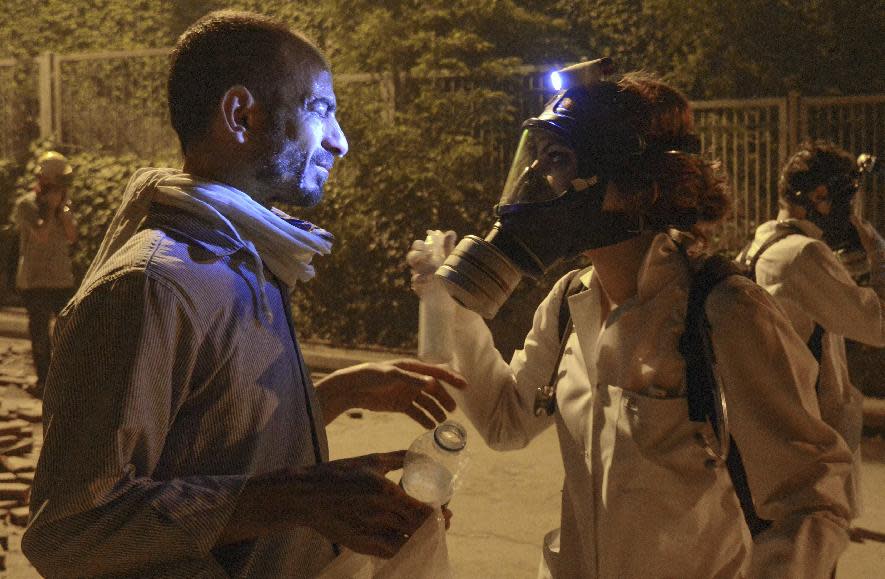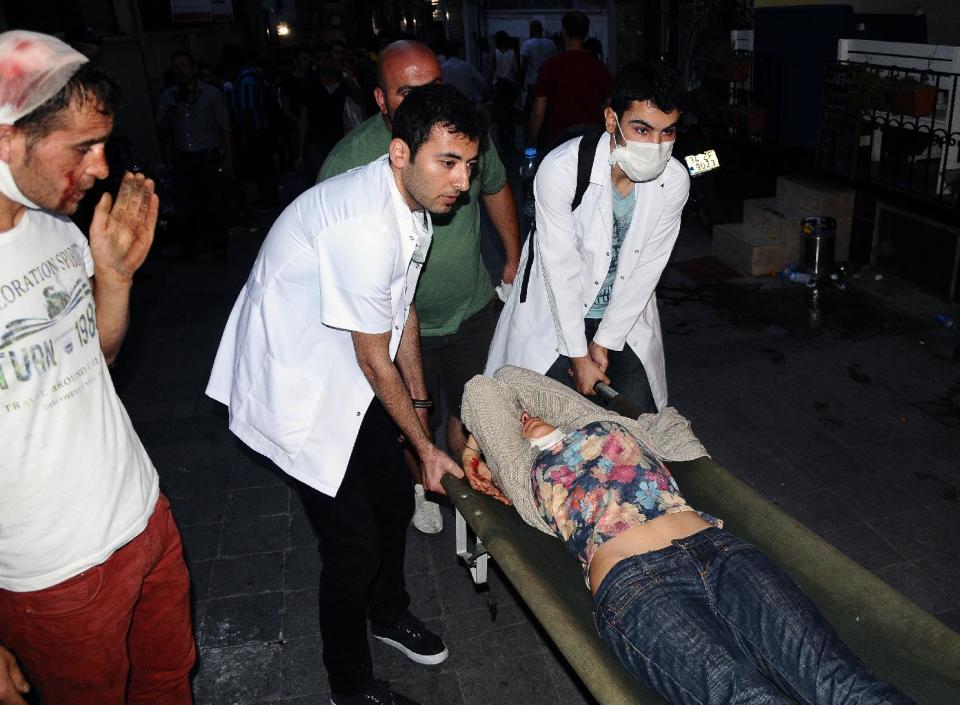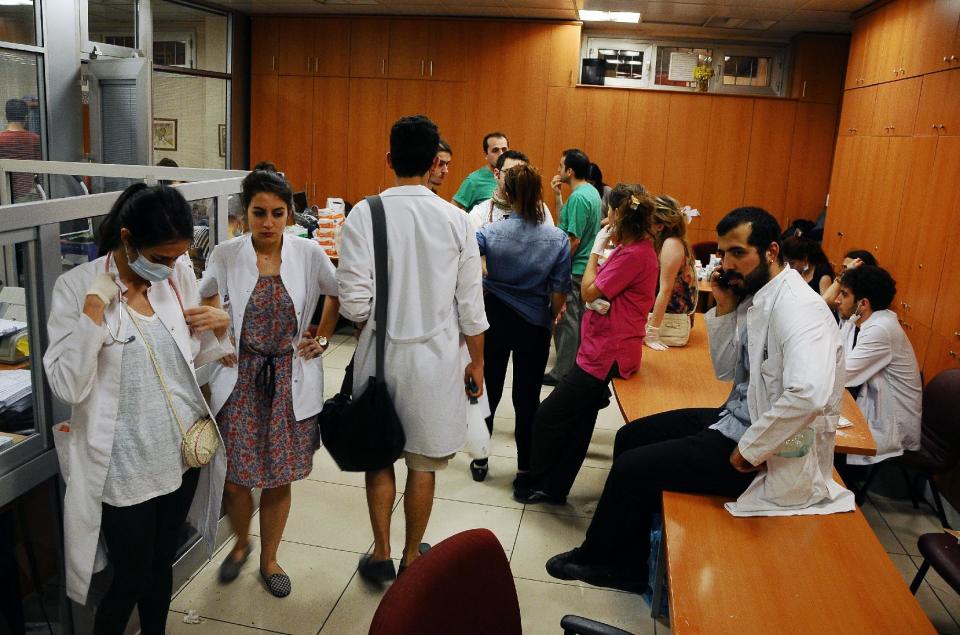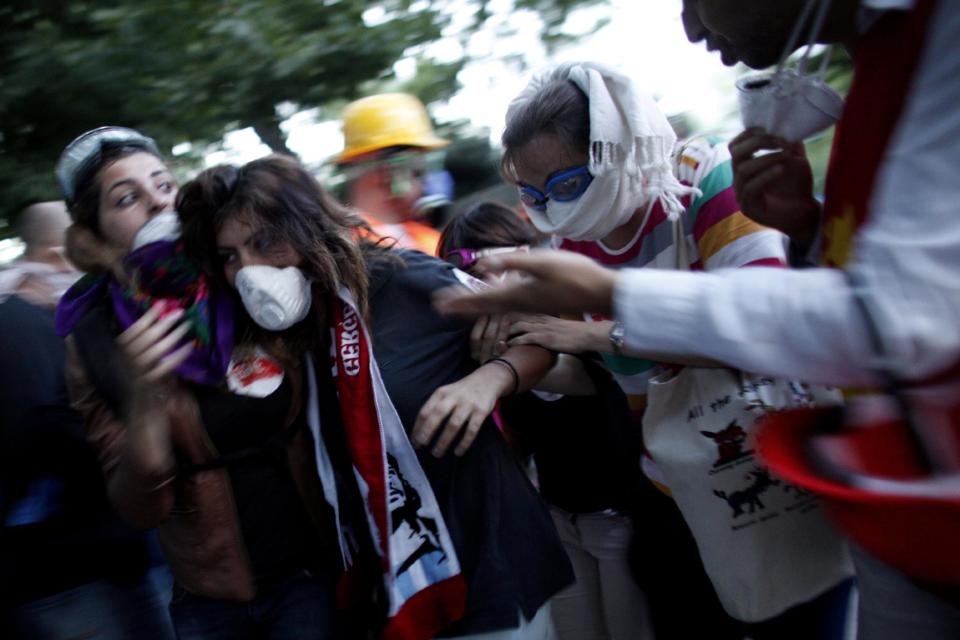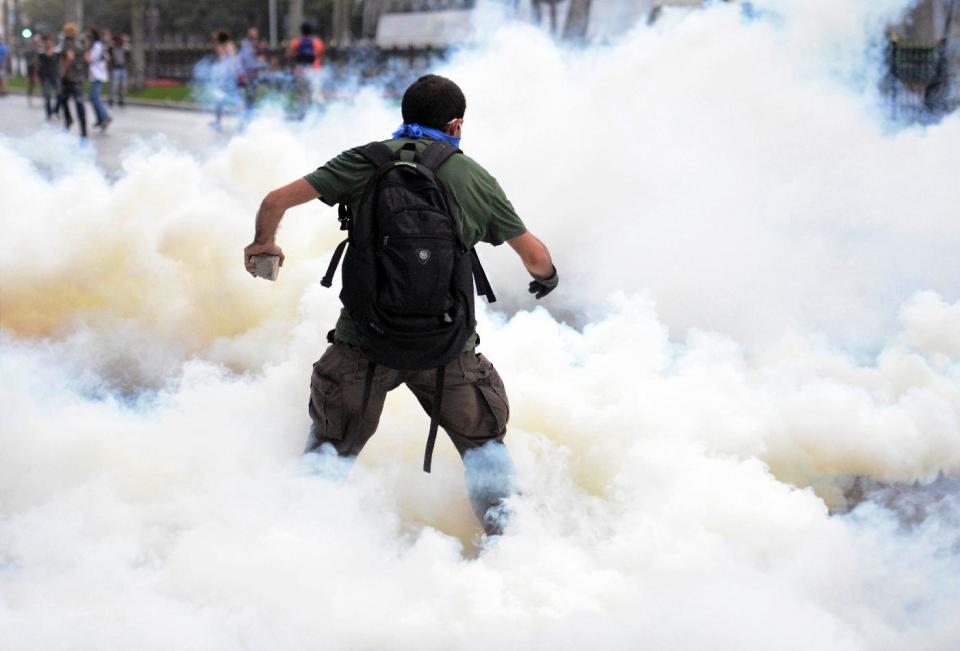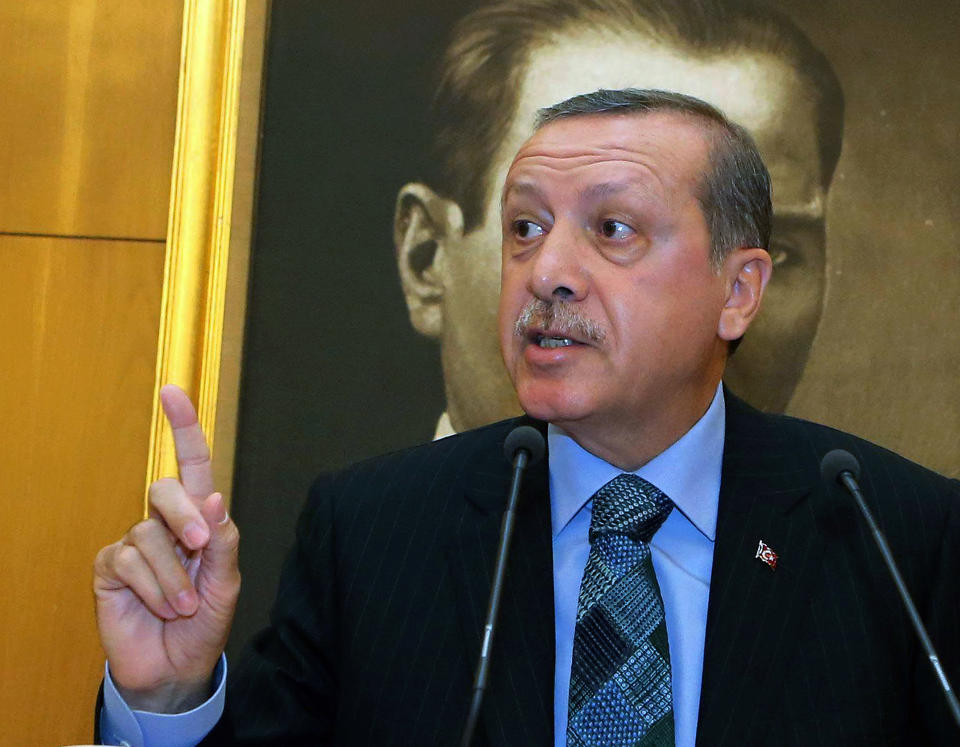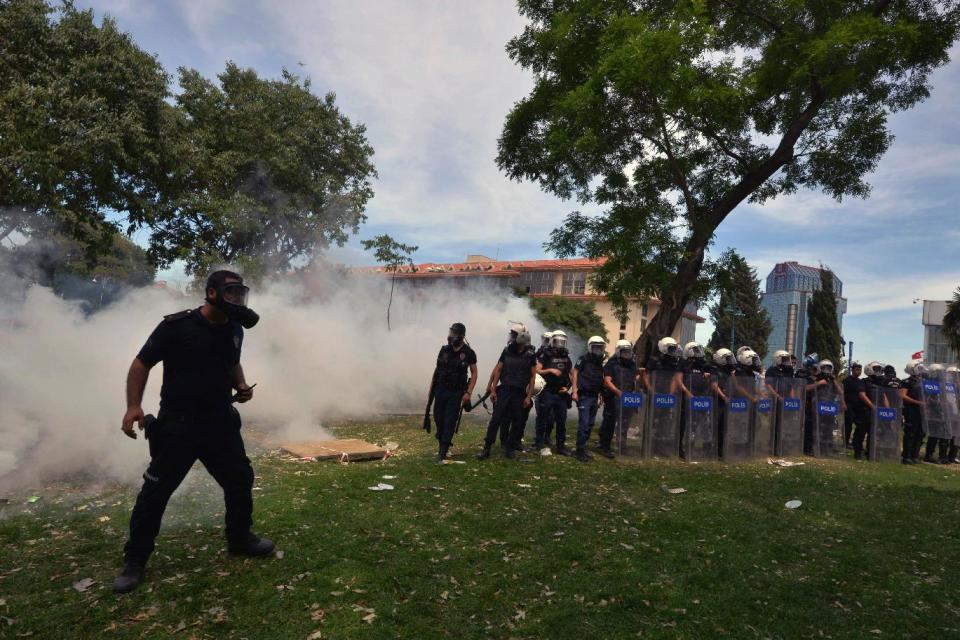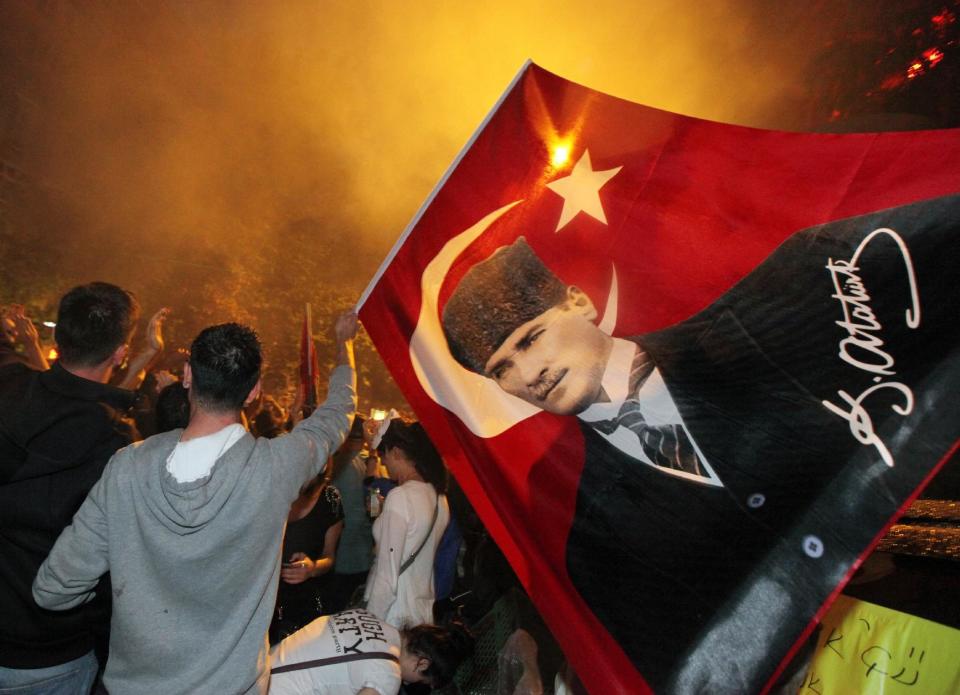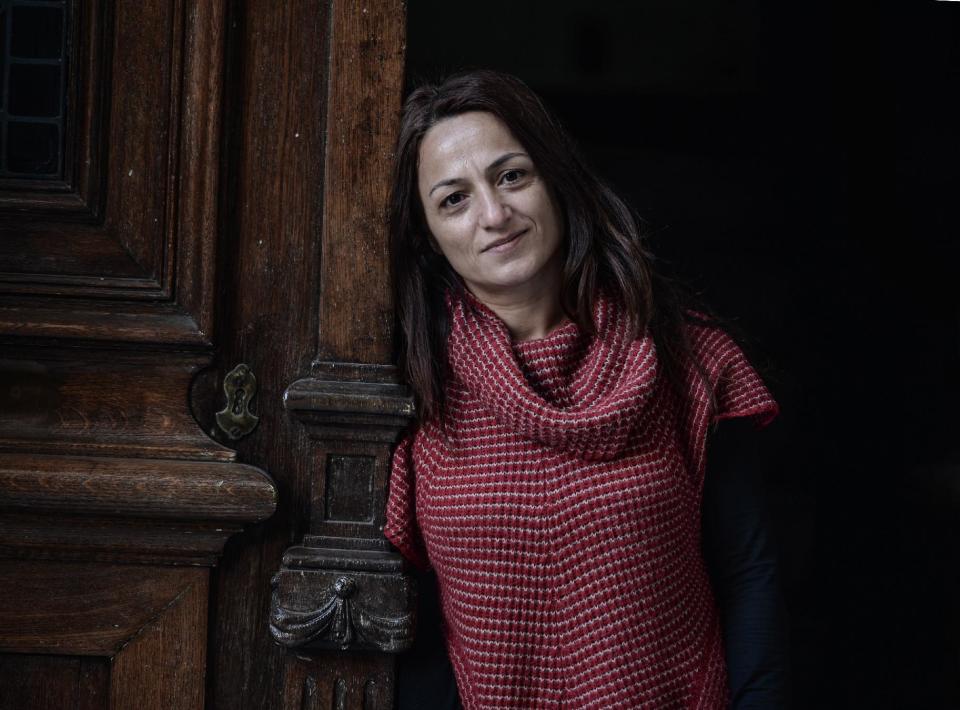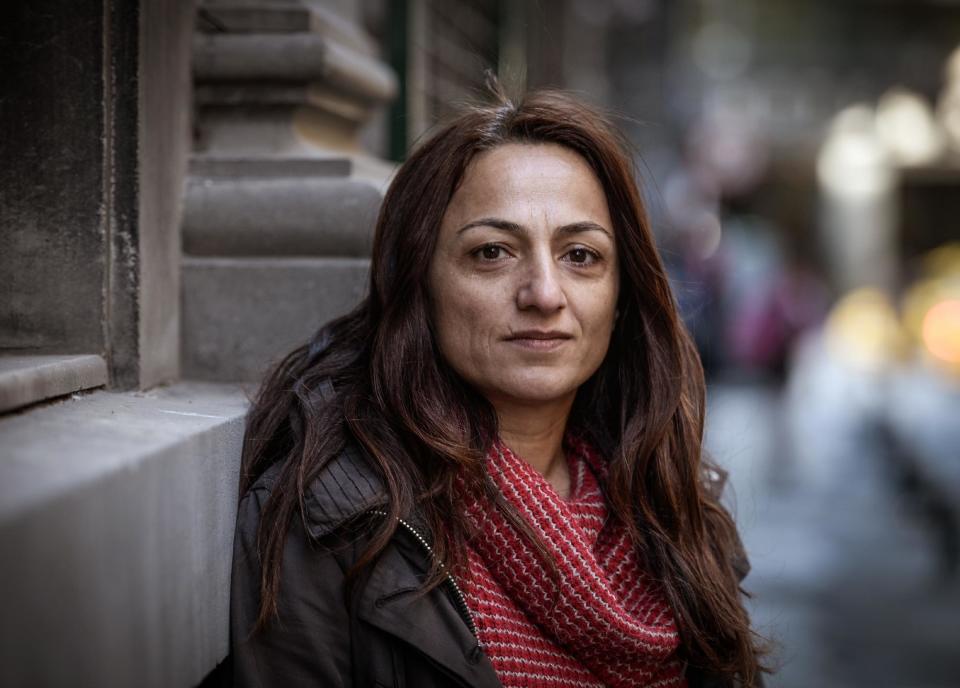Turkey doctors say police, govt harassed them
ISTANBUL (AP) — It was the height of Turkey's summer of upheaval, and riot police were hammering protesters. The tear gas at Istanbul's Taksim Square was so thick that doctors trying to treat the wounded in a makeshift clinic could barely breathe or see.
So a group of doctors set off to find relief in a nearby hospital. They turned into an alley and came face-to-face with police, just yards away. The officers took aim, lifted their guns and launched tear gas canisters straight at the medics in their white lab coats. "It was clear that we were doctors," Incilay Erdogan said to The Associated Press.
While some medics this summer complained of mistreatment as they treated protesters against the Turkish government, the extent of the harassment has now become much clearer. In interviews with The Associated Press over the five months since, more than a dozen doctors said authorities had assaulted them with tear gas, chased and beat protesters in hospitals, pressured them to reveal the names of patients and ignored calls for more resources, including ambulances.
Nor has the crackdown stopped since. A prosecutorial indictment signed last month against a doctor and a medical student, seen by the AP, starkly contradicts a government statement that it would take no action against medical personnel giving care to protesters. And a bill passed by the Turkish parliament last week, and now before Turkish president Abdullah Gul, could give authorities new powers to prosecute doctors for giving unauthorized care, critics say. The bill follows more recent anti-government protests in recent weeks over a bribery scandal that forced four government ministers to step down.
The medical community says its professionals are hidden victims of a violent lashing out against dissent that has undermined the reputation of Prime Minister Recep Tayyip Erdogan as a democratic reformer. The United States and European powers see Erdogan as a vital strategic partner, especially in dealing with the Syria conflict, but have become alarmed by what looks like a deepening disregard for human rights.
The Ministry of Health defended its position in a statement to the AP: "It is greatly unfair to claim that there were shortfalls in the provision of health services during the protests."
The Turkish national police also noted in a statement the challenge posed by the sheer size of the demonstrations, which it described as 5,532 protests in 80 provinces with the participation of more than 3 million people from May to September. The statement said inspectors have been appointed to probe instances where unnecessary force may have been used but denied that doctors were specifically targeted.
"Our security units have not intervened against doctors who are exercising medical profession or those exercising their rights to peaceful demonstration," it said.
Many doctors, including some interviewed for this story, admit to sympathies with the protesters, and some took part in protests without medical garb when they were not treating patients. However, Turkish and international human rights groups say the Erdogan government's clampdown on doctors still violated international codes designed to protect medical personnel in conflicts. The neutrality of doctors while treating the injured in conflicts dates back to the ancient Hippocratic Oath, and is codified in international law and human rights treaties, many of which Turkey has signed.
"Something happened during the protests in June that usually doesn't happen in war," said Dr. Selcuk Atalay, the general secretary of the Turkish Medical Association's Ankara chapter.
The police told the AP that claims by the medical association and NGOs about abuses against doctors were "based on insufficient information and don't reflect the truth."
In late May and June, hundreds of thousands of Turks took to the streets calling for greater democratic freedoms, in protests initially sparked by opposition to government plans to develop Gezi park in downtown Istanbul. Police fired water cannons, rubber bullets and tear gas, and beat protesters with batons, resulting in thousands of injuries and five deaths. Many injuries and at least one death were caused by direct hits from tear gas canisters fired from close range at high speed, although the doctors who say they were targeted in this way were not seriously injured.
Doctors at Taksim Egitim ve Arastirma Hospital and the German Hospital — both near the center of the Istanbul protests — said tear gas was sometimes fired directly at the emergency room doors, seeping inside and hampering their work treating the injured.
One day, about half a dozen protesters ran into the emergency room at Istanbul's German Hospital, followed closely by riot police, according to the doctor in charge, Serdar Cifcili. After one protester locked himself into an observation room, police broke down the door and beat him, Cifcili said. He said he heard two other protesters, including one woman, being beaten elsewhere in the hospital. Another time, he said, the radiology department shut down for hours because of tear gas, creating long waits for patients needing X-rays.
On several occasions, doctors say, the police gassed temporary clinics while patients were being treated. On June 22, police fired tear gas through a gap under a door shuttered for protection at a clinic, according to doctors present, including Incilay Erdogan, who chairs the human rights committee of the medical association's Istanbul chapter
Erdogan, who is not related to the prime minister, recalled treating a teenage patient with severe chest trauma inside a makeshift Istanbul clinic. She dialed 112, the Turkish emergency hotline. But the dispatcher initially refused to send an ambulance stationed about 200 meters (yards) away, claiming that the ambulance drivers feared for their safety. In the end, despite assurances from the dispatcher that an ambulance was coming, it never did. Erdogan helped other doctors carry the injured protester to a taxi that brought him to the hospital.
Repeated requests to the Ministry of Health to increase medical resources in the protest areas, especially ambulances, were ignored, according to the medical association's Istanbul chapter. Instead, doctors had to reach out to hospitals and ambulance services run by the city's municipalities, which operate independently.
"The Gezi events took place in large cities, generally in city centers. There was no question of any shortfalls in the provision of health services in those locations," the Ministry of Health said in its statement. The ministry has also said that protesters damaged nine ambulances stationed at Gezi Park.
Doctors in hospitals also told AP they felt pressure not to provide extra care to the protesters. A doctor at the government-run Taksim hospital, who spoke on condition of anonymity because he feared reprisal, said he witnessed government inspectors reviewing security footage in the hospital to determine whether doctors and medical personnel had volunteered services outside shifts in the overwhelmed emergency rooms.
"I heard the inspector ask questions about specific people on the footage, like, 'That nurse, is she on duty? Why is she bandaging the patient?'" the doctor recalled.
Gunera Polatogullari, a nurse at the Taksim hospital, said she was the subject of a Ministry of Health investigation in which she was accused of helping to treat protesters while off duty. She says she was confronted with security video in which she is seen handing something over to two people in white lab coats. She admits to Ministry of Health charges that she did not know who those people in the lab coats were. The investigation's conclusion, seen by the AP, calls for disciplinary action.
An indictment by Turkish prosecutors against people involved in the summer protests, dated Dec. 6 and viewed by the AP, also accuses a doctor and a medical student, who treated protesters inside the Dolmabahce Mosque in Istanbul, of violating Turkish law. Prosecutors accuse the doctor and the student of throwing trash and cigarettes in the mosque, considered a desecration. They also accuse the two of refusing to provide information on protesters treated, protecting criminals, and illegally providing medical assistance to the protesters in their professional clothes. The charges carry the possibility of more than a year in prison.
Asked whether the prosecution contradicted its statement to the AP, the health ministry said it could not comment on an ongoing legal matter.
Other doctors say they have been notified they are under investigation for their care of protesters.
Feray Kaya, a pediatric assistant who works in a government hospital, volunteered to treat the injured during the protests and helped to collect casualty data. After the protests subsided, Kaya received notices — one seen by the AP — that she was being investigated by the Ministry of Health. A letter from her hospital administration asks why she checked in on a protester brought to the emergency room after being hit in the head with a tear gas canister. A second letter from the ministry asks about her work setting up the temporary clinics.
"Did you or did you not actually serve in these voluntary infirmaries?" the letter asks.
Kaya said she and other doctors who treated patients in the streets eventually removed lab coats and medical identification because they felt the gear was painting a bull's-eye on them for police. "We started to feel like we were prey," she said.
Other doctors, who requested anonymity for fear of reprisals, reported receiving similar letters. And in a June 13 letter seen by the AP, the Ministry of Health asked the medical association for the names of both doctors working at the makeshift clinics and the patients they treated. The association refused to provide information. Doctors say the association antagonized the government by organizing clinics and publishing a report, which was challenged by the ministry, detailing the thousands of injuries.
"They were bothered by the fact that the events were being objectively reported by doctors," says Ali Cerkezoglu, the secretary general of the association's Istanbul chapter, who was also detained for involvement in the protests. "We were also caring for the protesters and the police saw this as allowing them to continue."
The legislation passed by the parliament calls for fines and imprisonment of up to three years for treatment of patients without authorization by the Ministry of Health, with the exception of unexpected emergency care until authorized care arrives. The law specifically forbids establishing clinics without government authorization. A provision that could also limit doctors' pay had also mobilized doctors against passage.
"Instead of supporting doctors and other health workers, who are following their ethical duty to provide care to protesters, they are in the process of making it a crime to render emergency health services," says Vincent Iacopino, senior medical adviser to the U.S.-based advocacy group Physicians for Human Rights, which published a September report on abuses against medical personnel during the protests. The Turkish Medical Association, which is independently funded and counts 80 percent of Turkish doctors as members, says it won't abide by the legislation if passed.
"It's in no way acceptable," says Cerkezoglu of the association's Istanbul chapter. "It's against universal principles and entirely against ethical values."
The United Nations' special rapporteur on the right to health criticized the bill last month and urged Turkish lawmakers to reconsider. The World Medical Association also condemned the bill.
On the night when Dr. Erdogan and her colleagues were fired upon with tear gas, they took shelter in a hospital courtyard near the emergency room. But there was no respite. The police were clashing with protesters directly outside the hospital and launched tear gas into the courtyard.
"Our thinking was: this is a state hospital, there are patients here, we will be safe," said Erdogan. "Nowhere was safe."
___
Suzan Fraser in Ankara and Berza Simsek in Istanbul contributed to this report.
___
Follow Desmond Butler on Twitter at: www.twitter.com/desmondbutler
